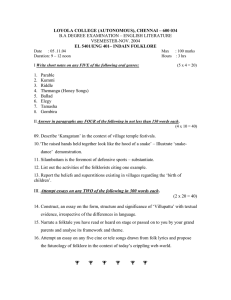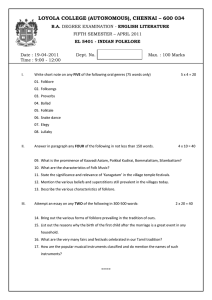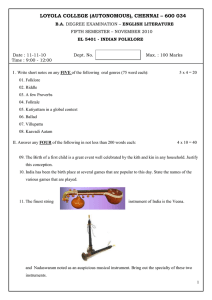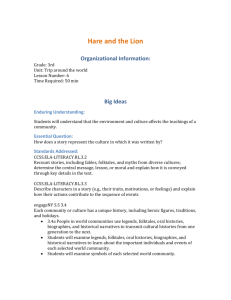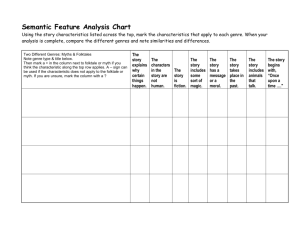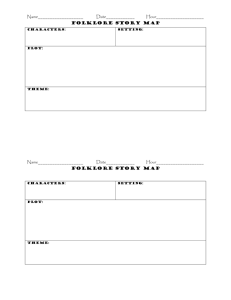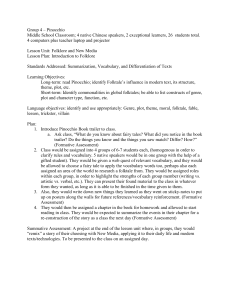Committee for «Folktales and the Internet
advertisement
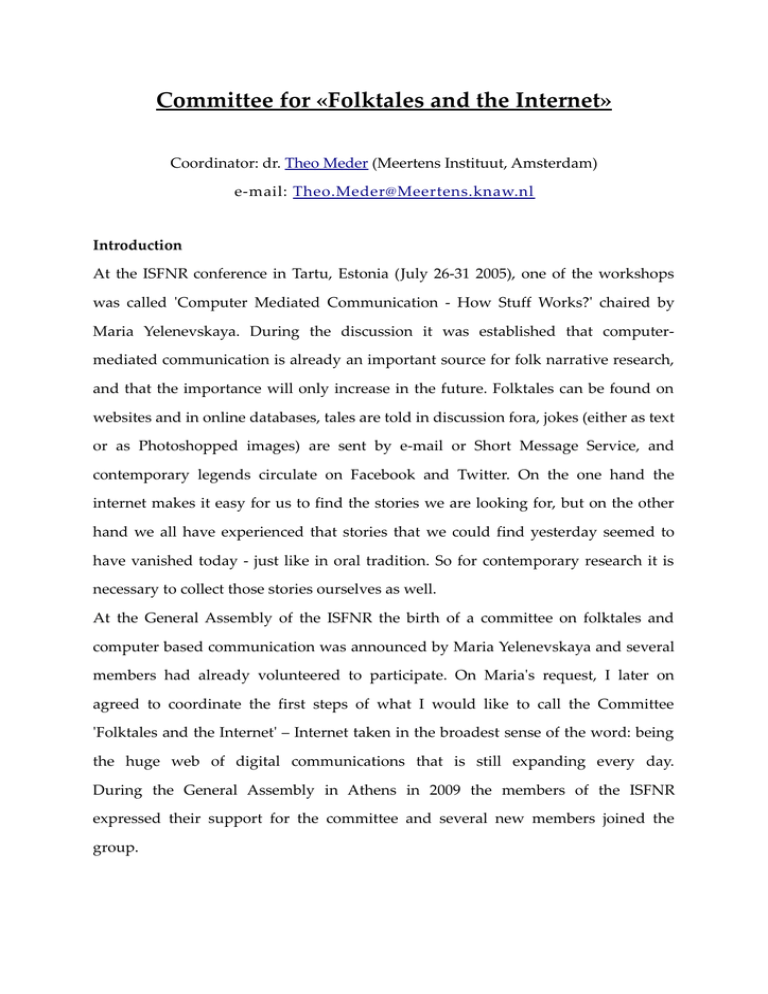
Committee for «Folktales and the Internet» Coordinator: dr. Theo Meder (Meertens Instituut, Amsterdam) e-mail: Theo.Meder@Meertens.knaw.nl Introduction At the ISFNR conference in Tartu, Estonia (July 26-31 2005), one of the workshops was called 'Computer Mediated Communication - How Stuff Works?' chaired by Maria Yelenevskaya. During the discussion it was established that computermediated communication is already an important source for folk narrative research, and that the importance will only increase in the future. Folktales can be found on websites and in online databases, tales are told in discussion fora, jokes (either as text or as Photoshopped images) are sent by e-mail or Short Message Service, and contemporary legends circulate on Facebook and Twitter. On the one hand the internet makes it easy for us to find the stories we are looking for, but on the other hand we all have experienced that stories that we could find yesterday seemed to have vanished today - just like in oral tradition. So for contemporary research it is necessary to collect those stories ourselves as well. At the General Assembly of the ISFNR the birth of a committee on folktales and computer based communication was announced by Maria Yelenevskaya and several members had already volunteered to participate. On Maria's request, I later on agreed to coordinate the first steps of what I would like to call the Committee 'Folktales and the Internet' – Internet taken in the broadest sense of the word: being the huge web of digital communications that is still expanding every day. During the General Assembly in Athens in 2009 the members of the ISFNR expressed their support for the committee and several new members joined the group. Ambition of the Committee The ambition of the committee is to use the Internet both as a source and as a tool. On the one hand the Internet is becoming an ever expanding source of narratives. Special collections for ethnologists, philologists and cultural historians are the folktale databases that work with the international Type-Index by Aarne-Thompson-Uther, and the Motif-Index by Thompson and other appropriate metadata to identify and enable to compare stories. Here are the European databases being used today: Database Country/Region Number of Founder tales Dutch Folktale The Netherlands 43,000 Theo Meder Flanders (Belgium) 48,000 Stefaan Top Portugal 3,500 Paulo Correia & Database Flemish Folktale Database Archive of Portuguese Legends Rondcat Isabel Cardigos Catalonia (Spain) 6,000 Josep M. Pujol † & Carme Oriol Carazo Georgian Folklore Georgia 29,000 Elguja Dadunashvili Denmark 30,000 Tim Tangherlini Sagnagrunnur Iceland 10,000 Terry Gunnell WossiDiA Mecklenburg (Germany) 350 Christoph Schmitt French Folktale France Anne Garcia-Fernandez Database Danish Folktale Database (+ 2nd) Database 100 (see Anne Garcia-Fernandez et al. 2014) All these databases at least function as a national or regional archive of cultural heritage (oral tradition). In the second place these databases can be used as a research tools by scholars and students. Enriching the narrative texts with metadata (when and where was the story told, collected by whom? Is it an internationally known folktale?) enables researchers to perform more diachronical and synchronical research into oral variation and stability, into local story communities and repertoires. Once a database is established, all kind of extra research tools could be programmed: visualisations like word clouds, geographical dispersion, timelines, diagrams and clustering tools. Dispersion of collected fairy tales in the Dutch Folktale Database Another wonderful future tool would be an international harvester that can perform queries in all the existing databases simultaneously, and with that feature improving international comparative research. An important condition would be that all the databases (at least in part) use the same kind of metadata, for instance the ATU TypeIndex. However, an International Type-Index of Legends doesn't even exist; this would be another goal to strive for as well. So here are the ambitions of the committee 'Folktale and the Internet' in a nutshell once more: 1. Study the World Wide Web as a means for narrative communication 2. Collect and preserve analog and digital folktales in online databases 3. Enrich the folktale databases (as digital archives of traditional oral heritage) with ample and internationally approved metadata 4. Develop digital tools for research (visualisation tools for geographical dispersion, word clouds, timelines, clustering tools) 5. Develop an international harvester with a sophisticated search engine for comparative research on big data 6. Make an International Type-Index of Legends (starting with Europe) I hereby would like to invite more ISFNR members to join - just by sending me an email. Dr Theo Meder (Amsterdam, December 14, 2014) Selected bibliography Abello, James, Peter Broadwell & Timothy R. Tangherlini: ‘Computational folkloristics’, in: Communication of the ACM 55 (July 2012) 7, pp. 60-70. Alsheimer, Rainer: 'Apocalyps now? Eschatologisches im Internet und anderswo?', in: Schweizerisches Archiv für Volkskunde 95 (1999) 1, p. 47-59. Brednich, Rolf W.: www.worldwidewitz.com. Humor im Cyberspace. Freiburg [etc.] 2005. Brunvand, Erik: 'The heroic hacker: Legends of the computer age', in: Jan Harold Brunvand: The Truth Never Stands in the Way of a Good Story. Urbana 2000, p. 170-198. Dégh, Linda: 'Collecting legends today - welcome to the bewildering maze of the Internet', in: Ingo Schneider (ed.): Europäische Ethnologie und Folklore im internationalen Kontext. Festschrift für Leander Petzoldt zum 65. Geburtstag. Frankfurt [etc.] 1999, p. 55-66. Ellis, Bill: 'Legend / AntiLegend. Humor as an Integral Part of the Contemporary Legend Process', in: G.A. Fine, V. Campion-Vincent & C. Heath: Rumor Mills. The Social Impact of Rumor and Legend. New Brunswick & London, 2003, p. 123-140. Ellis, Bill: 'Making a Big Apple Crumble: The Role of Humor in Constructing a Global Response to Disaster', in: Peter Narváez (ed.): Of corpse. Death and humor in folklore and popular culture. Logan, Utah State University Press, 2003, p. 35-79. Fialkova, Larissa & Maria N. Yelenevskaya: 'Ghosts in the cyber world. An analysis of folklore sites on the Internet', in: Fabula 42 (2001) 1/2, p. 64-89. Foley, James Miles: Oral Tradition and the Internet. Pathways of the Mind. Urbana, Chicago and Springfield: University of Illinois Press, 2012. Garcia-Fernandez, Anne, Anne-Laure Ligozat & Anne Vilnat: ‘Construction and Annotation of a French Folkstale Corpus’, in: Proceedings of the Ninth International Conference on Language Resources and Evaluation (LREC'14). Reykjavik, ELRA, 2014. Karsdorp, Folgert, Peter van Kranenburg, Theo Meder & Antal van den Bosch: 'Casting a Spell: Identification and Ranking of Actors in Folktales', in: F. Mambrini, M. Passarotti, C. Sporleder (ed.): Proceedings of the Second Workshop on Annotation of Corpora for Research in het Humanities (ACRH-2). Lisbon 2012, pp. 39-50. Karsdorp, Folgert, Martin van der Meulen, Theo Meder & Antal van den Bosch: 'MOMFER: a Search Engine of Thompson's Motif Index of Folk Literature', in: Folklore 2015. (to be published) Krawczyk-Wasilewska, Violetta: 'Post September 11th: Oral and Visual Folklore in Poland as an Expression of the Global Fear', in: Consciousness, Literature and Arts (2003) 4, 3. Krawczyk-Wasilewska, Violetta: 'e- Folklore in the Age of Globalization', in: Fabula 47 (2006) 3/4, p. 248-254. Krawczyk-Wasilewska, Violetta, Theo Meder & Andy Ross: Shaping Virtual Lives: Online Identities, Representations and Conducts. Łódz, University of Łódz, 2012. Kuipers, Giselinde: 'Media culture and internet disaster jokes: Bin Laden and the attack on the world trade center', in: European Journal of Cultural Studies 5 (2002) 4, p. 451-471. Meder, Theo: ‘Internet’, in: Haase, D. (ed.): The Greenwood Encyclopedia of Folktales and Fairy Tales (volume 2). Greenwood Press, 2008, p. 489-495. Meder, Theo: 'From a Dutch Folktale Database towards an International Folktale Database', in: Fabula 51 (2010) 1-2, p. 6-22. Meder, Theo: 'The Folktale Database as a Digital Heritage Archive and as a Research Instrument'. In: Christoph Schmitt (ed.): Corpora Ethnographica Online. 2014 (to be published). Meder, Theo, Folgert Karsdorp, Dong Nguyen, Mariët Theune, Dolf Trieschnigg, Iwe Everhardus Christiaan Muiser: 'Automatic Enrichment and Classification of Folktales in the Dutch Folktale Database', in: Journal of American Folklore 2015 (to be published) Meder, Theo, Dong Nguyen & Rilana Gravel: 'The Apocalypse on Twitter', in: The Journal of Digital Scholarship in the Humanities 2015 (to be published) Muiser, Iwe Everhardus Christiaan, Mariët Theune & Theo Meder: ‘Cleaning up and Standardizing a Folktale Corpus for Humanities Research’, in: F. Mambrini, M. Passarotti, C. Sporleder (ed.): Proceedings of the Second Workshop on Annotation of Corpora for Research in het Humanities (ACRH-2). Lisbon 2012, pp. 63-74. Murray, Janet H.: Hamlet on the holodeck. The future of narrative in cyberspace. Fourth impression. Cambridge MA, MIT Press, 1998. Nguyen, Dong, Dolf Trieschnigg, Theo Meder, Mariët Theune: 'Automatic Classification of Folk Narrative Genres'. In: Proceedings of the Workshop on Language Technology for Historical Text(s) at KONVENS 2012, Vienna, Austria, 21 September 2012. Pearce, C.: 'Story as play space: narrative in games', in: L. King (ed.): Game on: The history and culture of video games. London, Laurence King Publishing Ltd., 2002, p. 112119. Schneider, Ingo: 'Erzählen im Internet: Aspekte kommunikativer Kultur im Zeitalter des Computers', in: Fabula 37 (1996), p. 8-27. Wiebe, Karl: This is not a hoax: urban legends on the internet. Baltimore, PublishAmerica, 2003. Members of the ISFNR Committee 'Folktales and the Internet' Rolf W. Brednich 21 Moana Road Kelburn Wellington 6005 NEW ZEALAND phone +64 49777912 rolf.brednich@paradise.net.nz University of Göttingen Institute for Cultural Anthropology / European Ethnology Friedländer Weg 2 D-37085 Göttingen GERMANY phone +48 (0) 551399489 fax +48 (0) 551392232 rbredni@gwdg.de Paulo Jorge Rodrigues Correia C.E.A.O. - University of Algarve Estrada de S. Luis 122-1º 8000-123 Faro PORTUGAL paulojcorreia66@gmail.com Larisa Fialkova Koresh Street 5 33726 IL - Haifa ISRAEL phone +972 48673321 (home) phone +972 48249713 (office) lara@research.haifa.ac.il Brigitte Frizzoni Universitaet Zuerich Institut für Populaere Kulturen Affolternstrasse 56 8050 Zürich SWITZERLAND brigitte.frizzoni@uzh.ch Terry Gunnell Rekagrandi 1 107 Reykjavík ICELAND phone +354 5254549 fax +354 55268066 terry@hi.is Mare Kõiva Department of Folkloristics Estonian Literary Museum Vanemuise 42-235 51003 Tartu ESTONIA phone +372 7377740 GSM +372 56218119 fax +372 7377706 mare@folklore.ee Violetta Krawczyk-Wasilewska Department of Folklore University of Lodz Ul. Jaracza 78 90-244 Lodz POLAND phone +48 426356207 wasil@uni.lodz.pl Emily Lyle University of Edinburgh, Celtic and Scottish Studies 27 George Square EH8 9LD Edinburgh Scotland UK phone +44 (0) 1316504152 or +44 (0) 1316504163 e.lyle@ed.ac.uk Theo Meder Meertens Instituut Joan Muyskenweg 25 1096 CJ Amsterdam THE NETHERLANDS phone +31 (0)20 462 85 58 fax +31 (0)20 462 85 55 theo.meder@meertens.knaw.nl Mrinal Medhi Department of English Damdama College Kulhati District, Kamrup Assam INDIA Phone: +91 (0)361-2820069 mmedhi8@gmail.com Dr Mahendra Kumar Mishra State SC/ST and Minority Education Coordinator Unit-V OPEPA Residential Address: D-9 Flat Kalpana Area Bhubaneswar 751014 INDIA phone 91+674-2310167(r) 094376-36436(m) Sadhana Naithani Centre of German Studies Jawaharlal Nehru University IND - New Delhi 110067 INDIA phone +91 1126166572 sadhanan@mail.jnu.ac.in Sanjukta Naskar B-4, Teachers' Flats, Janki Devi Memorial College Sir Gangaram Hospital Road New Delhi - 110060 INDIA Phone: +91-0-9899703350 sanjuktan2002@yahoo.co.in, sanjukta.sinha@gmail.com Marilena Papachristophorou University of Ioannina School of Philosophy, Dept. of History and Archaeology, Folklore Section 45110, Ioannina GREECE mpapach@cc.uoi.gr Yoel Perez Ben Gurion University ISRAEL 972-4-8383510 34 Bikurim St. Haifa, 3457707, Israel yoelprz@netvision.net.il Sanita Reinsone Archives of Latvian Folklore Institute of Literature, Folklore and Art Akademijas laukums 1 Riga, LV-1050 LATVIA tel. 371 72 28 632 sanita.reinsone@lulfmi.lv Shojaei Kawan, Christine Enzyklopädie des Märchens, Friedländer Weg 2 37085 Göttingen GERMANY phone +49 551395359 ckawan@gwdg.de Carme Oriol Carazo Universitat Rovira i Virgili Departament de Filologia Catalana Campus Catalunya Avinguda Catalunya, 35 43002 Tarragona ESPAÑA Phone +34 977 558 131 carme.oriol@urv.cat Piret Voolaid Department of Folkloristics Estonian Literary Museum Vanemuise 42 51003 Tartu ESTONIA phone +372 7377742 fax +372 7377706 piret@folklore.ee Maria Yelenevskaya Ein Gedi 3 Haifa 34529 ISRAEL phone +972 4833363 fax +972 48332952 ymaria@tx.technion.ac.il
